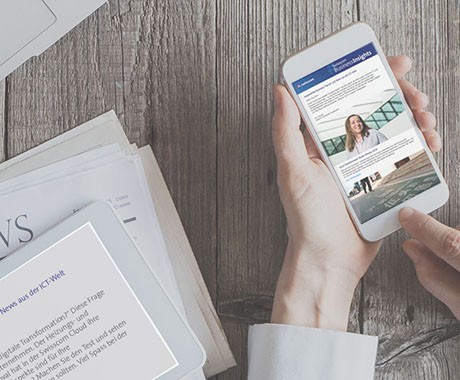Share trading in the blockchain
“C-Share is a bet on the future”
daura, the blockchain application from Swisscom and the law firm MME, makes trading with Swiss shares easier, more efficient and more secure. Just how this works is explained by Luka Müller from MME.
Text: Hansjörg Honegger, Images: Daniel Brühlmann, 08 May 2018
Your law firm MME is launching a blockchain project together with Swisscom for the digital issue and transfer of shares. What exactly does this involve?
Luka Müller: We provide an infrastructure for issuing and transferring shares on the blockchain, which makes it easier to manage shareholder registers, thus ultimately simplifying share trading. Blockchain is nothing more than an effective certificate mechanism you can use to transfer and register data (here shares) securely.
How does that work technically?
In technical terms, we’re talking about decentralised ledger systems that have a different validation effect. The data structure is interesting for us: We need a system that guarantees one-off, copy-proof data. We use Hyperledger as a basis.

Dr. Luka Müller explaining the benefits of the blockchain
What’s to gain?
Many companies currently find it hard to manage their shareholder registers, especially when shares change hands at a brisk pace. Blockchain offers an automated, simple booking system here. This ultimately allows us to enhance efficiency and streamline processes.
What target group are you focusing on? Large listed companies or rather SME?
At present, we’re tending to focus on medium-sized public limited companies and start-ups, who are looking for an efficient and simple share issuing system. Large companies are often integrated too deeply in existing systems.
Personal information
Dr. Luka Müller is co-founder of the law firm MME in Zug and Zurich. He is one of the pioneers of blockchain technology, advising numerous start-ups from this field on setting up in Switzerland. Dr. Luka Müller is also active as an expert in complex compliance cases and is an expert for measures against money laundering and corruption.
“Many companies currently find it hard to manage their shareholder registers, especially when shares change hands at a brisk pace. Blockchain offers an automated, simple booking system here.”
Dr. Luka Müller, co-founder of the law firm MME in Zug and Zurich.
Is your project simply a bet on the future?
Yes, it is. The certificate and signature concepts will be digitalised in future. Like in many other areas – paper looks set to be consigned to the past. daura, our solution is a step along this route.
Shares used to be printed, the signatures having been authenticated. How is the legal certainty of digital trading ensured?
Our solution builds on existing company law. There will be a book-entry securities register. The book-entry securities could be transferred via digitally certified signatures. Here we’ve teamed up with Swisscom as a highly competent partner.

Dr. Luka Müller in his law firm MME in Zurich
Is your solution comparable with the so-called ICOs (Initial Coin Offerings) that have been making headlines above all in the USA?
Yes, the solution is somewhat comparable in terms of the technology. Our solution has even already been referred to as ICO 2.0. But with daura we assign a so-called counterparty token, which “securitises” the right (membership right) against the issuer.
For many people, blockchain is synonymous with the somewhat discredited Bitcoins. Are you moving in shady circles?
No! Bitcoin is the best proof of concept for blockchain technology. Speculations and bubbles have nothing to do with the technology, they’re created by the market. As a reminder: Our solution gives you a counterparty token and so virtually the share certificate.
“Bitcoin is the best proof of concept for blockchain technology. Speculations and bubbles have nothing to do with the technology, they’re created by the market.”
Share trading should become easier and more efficient thanks to daura. Does that also mean less red tape?
We don’t gain anything when it comes to bureaucracy as we’re oriented towards Swiss company law. But secure information can now be established much more easily and efficiently thanks to blockchain. We can make a share transfer between A and B without having to involve a depository, while at the same time this transaction is registered in the company’s share register.
So you’re not evading state control with the blockchain?
No, not at all! This isn’t a matter of circumventing legal regulations but rather boosting efficiency.
So what’s easier if there’s not less red tape?
It’s possible, for instance, to sell a share by mobile phone and book this in a fraud-proof manner in the share register. The digital share register is also more accurate and up-to-date than any analogue share register.
“We can make a share transfer between A and B without having to involve a depository, while at the same time this transaction is registered in the company’s share register.”
Who’s left behind with your system?
Central administrators will certainly have to rethink their business model. But daura is merely an infrastructure component like a printing machine for securities and does not, for example, have any banking components. That’s not our goal either. On the contrary, daura offers a lot of cool opportunities for banks.
What was more difficult when implementing daura: the technological component or the legal aspect?
Neither one nor the other. Hyperledger gives us a functioning technology and we knew the tricky points when it comes to law. Bringing both poles together was the challenge.
The prototype is now live. Where does it go from here?
We’re entering phase two. The application needs to be tested and marketable with one or two capital increases by the fourth quarter of 2018.
DAURA – The new crypto-share platform that uses Blockchain (1:39)
Do you already have candidates for such a test?
Yes, we have several interested parties who can’t wait to get started.
From what sectors?
Various. The technology sector is represented, but also the insurance industry and, of course, every type of start-up.
How do you intend to make money with daura?
With the fees that companies pay.
Are these fees comparable with those of the analogue competition?
A technical solution scales from a certain volume. But it’s definitely interesting in terms of price. A cost-effective, accurate and up-to-date share register – these are good arguments for users.
“This isn’t a matter of circumventing legal regulations but rather boosting efficiency.”
What does the future hold in store for daura and digital shares?
We’re working on the virtual General Meeting of Shareholders, where you can vote with daura, for instance. Dividend payment on shares at the press of a button is also possible. That means I can not only transfer the share certificate as a certificate but also linked with functions.
The solution
MME and Swisscom are together managing the joint venture daura AG, which digitalises Swiss shares with the help of blockchain technology. daura, the corresponding application, guarantees the worldwide, secure transfer of Swiss shares and their registration on the blockchain. These so-called crypto shares enable non-listed companies to access the capital market. All legal functions of the shares, such as exercising voting rights, will be mapped in a smart contract.
Blockchain is the digital and distributed storage technology that enables all transactions without a middleman. The main advantages are: transparency, faster transactions, lower transaction costs and decentralisation. Company shares can be generated using an investment token within a “Token Generating Event (TGE)”. For a round of financing, tokens for a specified volume are issued to a group of investors by a blockchain-based program. In legal terms, shares are issued as book-entry securities that can be transferred simply and with legal effectiveness using an electronic signature.

Newsletter
Would you like to regularly receive interesting articles and whitepapers on current ICT topics?
More on the topic
